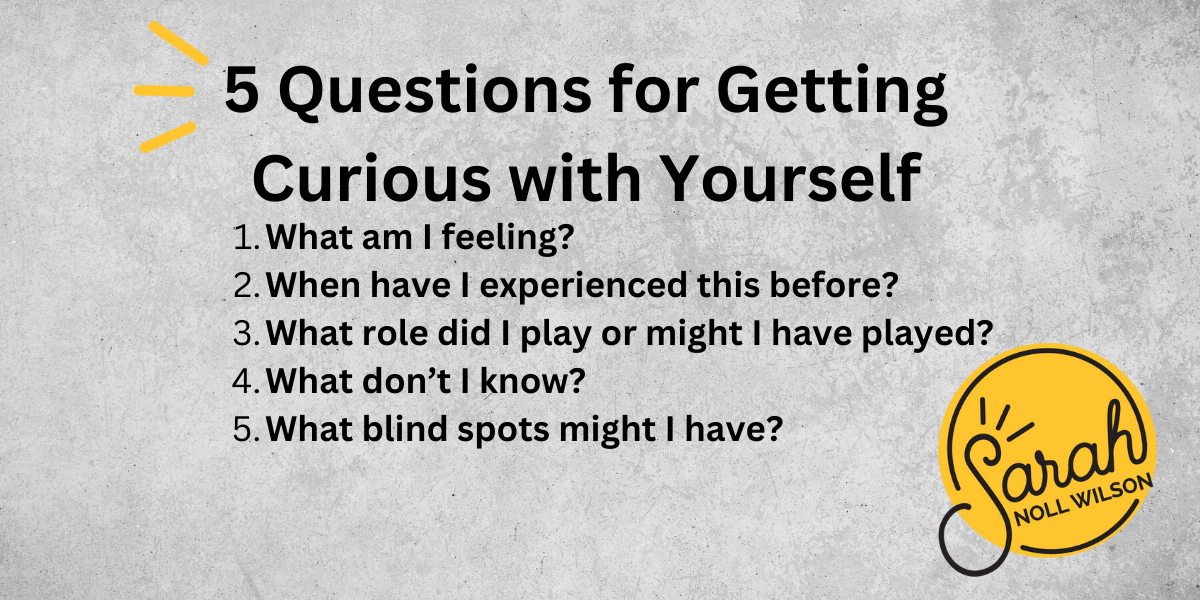
by Dr. Teresa Peterson
Few things are as powerful as self-awareness. This character bedrock not only helps us show up more fully for others, but it also deepens and strengthens our relationships with ourselves. This, in turn, helps us set purposeful boundaries and goals, get “unstuck,” and more effectively navigate situations in which the heat gets turned up. When we can self-assess where we’re at with a situation, what our insights are, and where we might have gaps in our thinking, we open ourselves up to so much growth.
One way we deepen our self-awareness is by leveraging the power of the first step of the Curiosity-First Approach™: getting curious with ourselves.
While this practice is super impactful, it doesn’t have to be time-consuming or difficult. Here are five questions you can use to get started:
1. What am I feeling?
One of the most powerful questions that we start with is: What am I feeling? This might seem basic, but sometimes we need a gentle nudge to consider how exactly we’re processing a situation and what emotions are coming up. Emotions are a legitimate data point.
Many who are socialized as men say they’ve been conditioned not to express feelings or emotions, and when they do, it’s usually anger or aggression that’s encouraged or represented as “normal,” making this step extra challenging. On the other hand, many who are socialized as women will say they’re not really considering what they’re feeling because they’re so focused on what others around them are feeling—again, a challenge.
The question is simple, but the answer isn’t always. Next time you feel stuck, start by getting curious about what feeling is coming up for you. When we name it, we can begin to move through it.
2. When have I experienced this before?
There is value in slowing down to interrogate when you may have felt this way or have been in a similar situation in the past. Our brain processes information in fractions of a second, so it can subconsciously remember a trauma tied to something that happened much faster than we’re even cognitively aware of that memory.
Asking this question serves two purposes: it can help you think about how this often plays out for you and what baggage you’re carrying from past experiences to today, and it can also help give us some ideas related to the other person’s perspective that could inform our next actions.
In a way, this question primes our brains to mine the past and look for possibilities.
3. What role did I play or might I have played?
When we feel stuck or the heat is turned up, it can be easy to immediately think about what others have done (or not done) in order for us to arrive at this place.
This is a fair question. But it’s not the only question.
Asking what role you played—or could have played—doesn’t mean you accept blame or responsibility in a blanketed way. It simply means you shift your focus for a bit on the possibility that your impact didn’t match your intention. Asking this question can help generate compassion for others. It can also help foster self-compassion as we begin to interrogate our own patterns of responses and behavior and examine a). where those originated and b). whether or not we are able to adjust for a more positive outcome moving forward.
4. What don’t I know about this?
We have a tendency to focus on everything we do know and pretend like that’s the whole puzzle. Very explicitly asking what we might not know can be a nice level-set and a grounding exercise that reframes our thinking and primes our brain for curiosity.
5. What blind spots might I have?
Especially when we’re around people who are like us or who we’ve known/worked with for some time, it can be easy to confuse that we have all the same information or all the same perspectives. The truth is that there are things all of us don’t know and perspectives we’ve yet to consider.
This comes up for me, even today. Recently, Sarah and I were talking about something, and I was nodding in the affirmative: “yep, yep, yep.” Only later did I realize what I’d missed: we don’t all have all the same knowledge or all the same perspective, even though we might have much in common. And for those who have different viewpoints, ideologies, and/or lived experiences, the downside of not carefully assessing our blind spots can be even more harmful.
What’s Next?
The next time you feel stuck and the heat is turned up, ask yourself these five questions. You might even keep this little graphic around on your desk, in your notebook, or in your car as a reminder.
Getting curious with yourself is a huge springboard for growth. Let me know if these work for you and what you would add to the list!


Dr. Teresa Peterson
Dr. Teresa Peterson is the Director of Learning and Development for Sarah Noll Wilson, Inc. In her daily work, she serves as Sarah’s key content collaborator. Teresa enjoys facilitating, researching, and is passionate about applying best practices for learning to make our experiences meaningful, engaging, and accessible for all types of learners. Teresa holds a Doctorate in Education from the University of Northern Iowa and brings over twenty years of experience teaching, facilitating, and leading to our team. Our clients love Teresa’s grounded energy, depth of thought, and ability to listen deeply.

